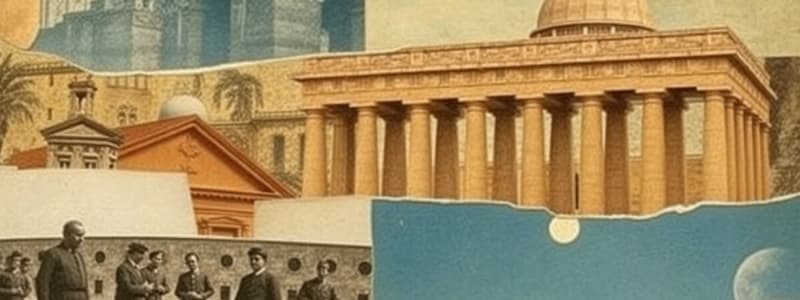Podcast
Questions and Answers
What sources does the study of history rely on?
What sources does the study of history rely on?
Written records, archaeological findings, and oral traditions.
What characterizes Ancient History?
What characterizes Ancient History?
The development of early civilizations like Mesopotamia, Egypt, Greece, and Rome.
Name one major event from Medieval History.
Name one major event from Medieval History.
The Crusades.
What significant movement often marks the beginning of Early Modern History?
What significant movement often marks the beginning of Early Modern History?
What are two key events of Modern History?
What are two key events of Modern History?
What is periodization in history?
What is periodization in history?
How does studying history promote critical thinking?
How does studying history promote critical thinking?
What does social history focus on?
What does social history focus on?
How does history help us understand the present?
How does history help us understand the present?
What is the primary concern of economic history?
What is the primary concern of economic history?
Flashcards
Ancient History
Ancient History
The period encompassing early civilizations like Mesopotamia, Egypt, Greece, and Rome.
Medieval History
Medieval History
The period after the fall of the Western Roman Empire and before the Renaissance.
Early Modern History
Early Modern History
History beginning with the Renaissance, including the Reformation and Enlightenment.
Modern History
Modern History
Signup and view all the flashcards
Periodization
Periodization
Signup and view all the flashcards
Chronological Approach
Chronological Approach
Signup and view all the flashcards
Social History
Social History
Signup and view all the flashcards
Cultural History
Cultural History
Signup and view all the flashcards
Importance of Studying History
Importance of Studying History
Signup and view all the flashcards
Historical Approaches
Historical Approaches
Signup and view all the flashcards
Study Notes
Historical Periods
- History encompasses the chronological record of events, encompassing human activities, societies, and cultures across time.
- It relies on various sources like written records, archaeological findings, and oral traditions.
- The study of history provides crucial insights into the development of human civilization and its diverse expressions.
- It helps us understand the present and anticipate potential future trends.
Major Historical Eras
- Ancient History: Characterized by the development of early civilizations, including Mesopotamia, Egypt, Greece, and Rome.
- Medieval History: Spanning from the fall of the Western Roman Empire to the Renaissance, this period saw developments in Europe. Prominent events include the Crusades, the rise of feudalism, and the Black Death.
- Early Modern History: Often begins with the Renaissance and encompasses major events like the Reformation, the Age of Discovery, and the Enlightenment.
- Modern History: Covers the period from the 18th century to the present day and features significant events like the Industrial Revolution, World Wars, and the rise of globalization.
Historical Approaches
- Periodization: Dividing history into distinct periods, often based on significant political, social, or economic changes.
- Chronological Approach: Examining events in a linear timeline, tracing cause and effect.
- Thematic Approaches: Analyzing specific themes or aspects of history, like the role of women or the impact of climate change.
- Social History: Focuses on daily life, social structures, and cultural practices of different groups and periods.
- Cultural History: Explores the diverse expressions of human creativity and meaning-making over time, examining artistic, religious, and intellectual developments.
- Political History: Centers on political structures, power dynamics, and governmental systems.
- Economic History: Studies the production, distribution, and consumption of goods and services across different eras.
Importance of Studying History
- Understanding the Present: History sheds light on current issues' roots, providing context for complex problems.
- Promoting Critical Thinking: Analyzing historical events fosters the development of critical thinking skills.
- Developing Empathy: Studying diverse cultures and experiences builds empathy and understanding.
- Learning from the Past: Examining past mistakes and successes helps in avoiding repeating mistakes and learning from successes.
- Enhancing Decision-Making: Historical insights offer valuable lessons for informed decision-making in various fields.
- Promoting Civic Engagement: Understanding history strengthens civic engagement and appreciation for democratic processes.
Studying That Suits You
Use AI to generate personalized quizzes and flashcards to suit your learning preferences.


